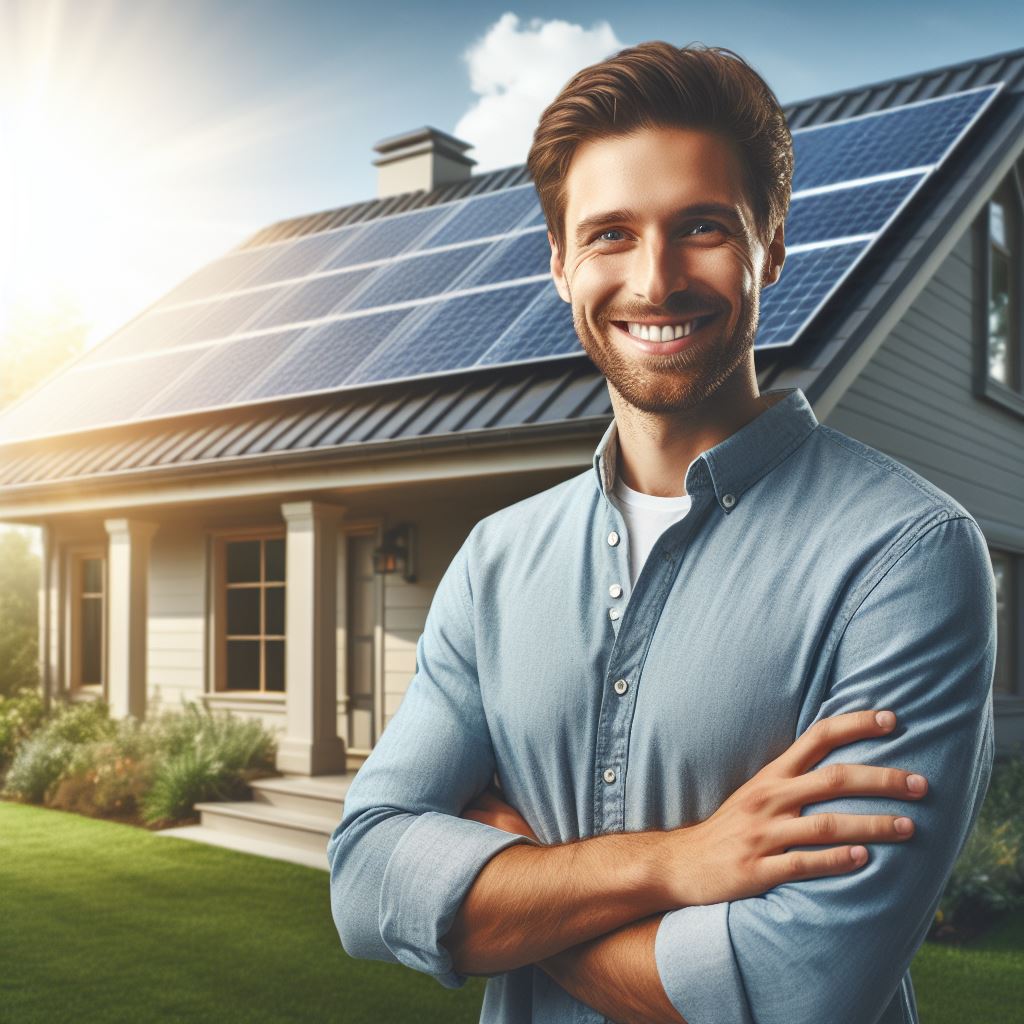Introduction
Solar roofing is a type of roofing that integrates solar panels into its design.
This innovative technology allows homeowners to convert sunlight into clean and renewable energy.
By harnessing the power of the sun, solar roofing offers several advantages for homeowners to consider.
First and foremost, solar roofing allows for significant cost savings on electricity bills.
By generating your own electricity, you can reduce or even eliminate your reliance on the grid.
With solar roofing, you can potentially offset a large portion, if not all, of your electricity usage, resulting in substantial savings in the long run.
Furthermore, solar roofing is an eco-friendly solution that contributes to a sustainable future.
Unlike traditional energy sources, solar power does not emit harmful greenhouse gases or pollutants.
By adopting solar roofing, you can reduce your carbon footprint and make a positive impact on the environment.
Solar roofing systems are also known for their durability. Designed to withstand extreme weather conditions, modern solar panels are built to last for decades.
With minimal maintenance required, investing in solar roofing ensures a long-lasting and reliable energy solution for your home.
In essence, considering solar roofing for your home is essential in this era of energy conservation and sustainability.
The benefits, including cost savings, environmental friendliness, and durability, make it a viable option for homeowners.
In the following sections, we will explore the various factors to consider when determining if solar roofing is right for your specific home.
Read: DIY Historical Home Renovation Tips
Benefits of Solar Roofing
Harnessing the Power of the Sun for Your Home
Energy Cost Savings
Slash electricity bills with solar roofing
The installation of solar panels on your roof allows you to generate your electricity.
By harnessing the sun’s energy, you significantly reduce your dependence on the traditional power grid.
As a result, your monthly electricity bills are likely to see a substantial decrease, leading to long-term savings for your household budget.
Unlock the potential for net metering
With solar roofing, you have the ability to become a prosumer.
Excess energy generated by your solar panels can be fed back into the grid, a process known as net metering.
This not only helps you offset the costs of electricity during times when your panels aren’t producing, but it can also turn your roof into a revenue-generating asset as you receive compensation for the surplus energy you contribute.
Environmental Advantages
Shrink your carbon footprint
Traditional energy sources, such as coal and natural gas, contribute to the release of greenhouse gases.
Solar roofing, on the other hand, relies on the sun’s abundant and clean energy.
By opting for solar, you actively participate in reducing your carbon footprint, contributing to a more sustainable and eco-friendly lifestyle.
Embrace a renewable energy source
Unlike fossil fuels that are finite and contribute to environmental degradation, solar energy is a renewable resource.
Solar panels convert sunlight into electricity without emitting harmful pollutants.
Choosing solar roofing means aligning your energy consumption with a sustainable, long-term solution that benefits both your home and the planet.
Long-Term Investment
Boost property value
Homes equipped with solar roofing systems are increasingly attractive to buyers.
The installation of solar panels signals a commitment to energy efficiency and sustainability, making your property stand out in the real estate market.
This increased desirability can translate into a higher resale value, offering a return on investment beyond the immediate energy cost savings.
Enjoy government incentives
Governments around the world offer various incentives to encourage the adoption of renewable energy.
This can include tax credits, rebates, and other financial perks.
By investing in solar roofing, you position yourself to take advantage of these incentives, making the upfront cost more manageable and accelerating the overall return on your investment.
In short, the benefits of solar roofing extend far beyond simple economic considerations.
While the energy cost savings are a significant draw, the environmental advantages and long-term investment aspects make it a holistic choice for homeowners.
It’s an opportunity to contribute to a greener planet, enhance your property’s value, and take advantage of government support for sustainable initiatives.
Solar roofing isn’t just about practicality; it’s a statement about responsible living and a commitment to a brighter, cleaner future.
Read: Energy-Saving DIY Projects for Your Home
Factors to Consider
When deciding if solar roofing is the right fit for your home, diving into the details of specific considerations is crucial.
Let’s explore each factor in depth:
Roof Orientation and Shading
Optimal Sunlight
South-facing roofs boast unparalleled exposure to sunlight, making them the prime location for solar panel installation.
This orientation maximizes the absorption of sunlight throughout the day, optimizing energy production.
The active choice of a south-facing roof ensures that your solar system operates at peak efficiency, translating into increased cost savings and environmental benefits.
Shading Concerns
Even with a south-facing orientation, shading can compromise the effectiveness of solar panels.
Nearby structures, such as buildings or trees, may cast shadows on your roof, reducing the amount of sunlight your solar system can capture.
Conduct a thorough analysis of potential shading sources, ensuring your chosen location remains free from obstruction to guarantee consistent energy generation.
Roof Condition and Lifespan
Compatibility Check
Before installing solar panels, it’s imperative to assess the structural compatibility of your roof. Solar systems add weight and require secure anchoring.
Ensuring your roof can withstand these additional loads is crucial.
A structural inspection by a professional ensures a seamless integration, preventing potential damage to your roof and safeguarding your solar investment.
Repair or Replace
A comprehensive evaluation of your roof’s current condition is essential.
Address any existing issues, such as leaks, damaged shingles, or structural weaknesses, before proceeding with solar installation.
Neglecting necessary repairs may lead to complications, affecting the efficiency and lifespan of both your roof and solar system.
Regional Climate and Sunlight Availability
Sunlight Analysis
Investigate the average sunlight hours in your region. A high number of sunlight hours is advantageous for maximizing energy production.
Solar systems thrive in sunny climates, ensuring consistent power generation and enhancing the overall return on your investment.
Weather Patterns
Consider the local climate and potential seasonal variations. Robust solar systems are designed to adapt to diverse weather conditions.
Understanding how your solar panels perform in different scenarios allows for strategic planning, ensuring your energy needs are met throughout the year.
This proactive approach ensures the longevity and reliability of your solar roofing system.
All in all, a meticulous examination of these factors equips homeowners with the knowledge needed to make informed decisions about solar roofing.
By actively addressing each consideration, you pave the way for a sustainable and efficient energy solution that aligns seamlessly with your home and environmental goals.
Cost Considerations
Understanding the cost considerations of solar roofing is pivotal in making an informed decision. Let’s delve deeper into each aspect.
Initial installation expenses
The initial installation expenses of solar roofing can vary depending on various factors.
- Equipment and material costs: Solar panels are the fundamental component of the system. The cost of panels will depend on the size, efficiency, and brand.
Additionally, inverters, wiring, mounting hardware, and other installation materials should be factored in. - Labor charges: Installing solar roofing requires technical expertise. Hiring professionals for the installation ensures proper setup and adherence to safety standards.
The labor charges will depend on the complexity of the installation and the size of your roof.
Return on investment
Assessing the return on investment (ROI) is crucial to understand the economic benefit of solar roofing.
- Estimating payback period: The payback period refers to the time it takes for the accumulated savings on electricity bills to equal the initial investment.
Factors such as energy consumption, local electricity rates, and the size and efficiency of the system will influence the payback period. - Calculating long-term savings: Solar roofing systems have a lifespan of 25-30 years.
By calculating the potential savings on electricity bills over this period, you can understand the long-term financial benefits.
Consider factors like inflation, possible rate hikes, and system maintenance costs during this evaluation.
Financing options
Exploring financing options can help make solar roofing more affordable.
- Leasing vs. buying: Leasing allows you to install a solar roofing system without the upfront costs.
However, buying the system outright provides greater long-term savings and ownership benefits.
Consider the financial implications and choose the option that aligns with your goals and resources. - Researching available subsidies or loans: Governments and organizations often provide subsidies, tax credits, or low-interest loans to encourage renewable energy adoption.
Research and explore these options to reduce the cost burden.
Local utility companies may also have programs that offer incentives or net metering, which allows you to sell excess energy back to the grid.
In general, evaluating the cost considerations of solar roofing is crucial to determine its viability for your home.
Understanding the initial expenses, return on investment, and financing options will help you make an informed decision that aligns with your financial goals and sustainability objectives.
Read: DIY Basics: Installing Your Own Lighting

Maintenance and Upkeep
Regular cleaning and inspection requirements
Maintaining a solar roofing system is essential for its optimal performance and longevity.
Regular cleaning and inspection are crucial aspects of maintenance and should not be overlooked.
Removing debris and dirt from solar panels is necessary to prevent any obstruction that might hinder their ability to generate electricity efficiently.
This can be done by using a soft brush or a mild detergent solution for cleaning.
It is important to follow manufacturer guidelines and avoid using abrasive materials that may scratch the surfaces.
Additionally, regular inspections are necessary to identify any damage or malfunction in the solar roofing system.
This may include checking for loose connections, worn-out parts, or signs of deterioration.
If any issues are detected, they should be promptly addressed to prevent further damage and ensure optimal performance.
Lifespan and warranty
Understanding the expected lifespan of solar panels is crucial for making informed decisions about their installation.
On average, solar panels have a lifespan of around 25 to 30 years.
It is important to consider this lifespan when planning for the long term and calculating the return on investment.
Furthermore, evaluating the warranty terms and coverage provided by the solar panel manufacturer is essential.
A comprehensive warranty should cover not only the panels but also related components such as inverters and mounting systems.
It is important to review the warranty terms and understand what is covered, the duration of coverage, and any conditions or limitations.
When installing solar panels, proper integration with the existing roof structure is crucial.
It is advisable to consult with a professional installer to ensure that the solar panels are securely and adequately attached to the roof.
This includes using appropriate mounting systems and ensuring a watertight seal to prevent any leaks or water damage.
Roof maintenance considerations
Consideration should also be given to future roof repairs or replacements. The solar panels should be compatible with any future roof maintenance or renovations.
This may involve considering the weight and design of the panels and their compatibility with different roofing materials.
Planning ahead can save time, effort, and costs if roof repairs or replacements are required in the future.
In review, regular cleaning and inspection, understanding the lifespan and warranty of solar panels, and considering roof maintenance are crucial for the proper maintenance and upkeep of a solar roofing system.
By following these guidelines and seeking professional assistance when needed, homeowners can ensure the longevity and optimal performance of their solar panels.
Read: Eco-Friendly DIY Home Upgrades to Try
Conclusion
Recap of Benefits and Considerations for Solar Roofing
In weighing the merits of solar roofing, numerous advantages emerge.
Lower energy bills, environmental sustainability, and increased property value stand out prominently.
The upfront investment may seem daunting, but government incentives and long-term savings make it a worthwhile financial commitment.
Maintenance is minimal, with solar roofs requiring little attention beyond occasional cleaning.
Considerations, however, should not be overlooked.
The suitability of your home for solar panels hinges on factors like roof orientation, shading, and local climate conditions.
A thorough assessment is crucial to ensure optimal energy production.
Additionally, installation costs and the availability of reliable solar installers can influence the decision-making process.
Encouragement to Assess Home Suitability for Solar Panels
Before taking the plunge into solar roofing, assess your home’s solar potential.
Examine your roof’s angle and orientation to maximize sunlight exposure. Identify potential shading obstacles, such as nearby trees or structures.
Leverage online tools or consult with solar professionals for personalized insights.
A solar site assessment provides a roadmap for a successful solar installation tailored to your home.
Final Recommendation Based on Individual Circumstances
In making the ultimate decision, consider your unique circumstances.
If your home receives ample sunlight, has a suitable roof, and you are committed to long-term sustainability, solar roofing is an excellent choice.
Financial incentives sweeten the deal, making the initial investment more accessible.
However, if shading issues persist, installation costs pose a financial burden, or your commitment to long-term residence is uncertain, alternative energy solutions might be more pragmatic.
Each homeowner’s situation is distinctive, and a tailored approach ensures the best outcome.
Solar roofing is a compelling option for many homeowners. With benefits ranging from cost savings to environmental stewardship, it merits serious consideration.
Yet, a thoughtful evaluation of your home’s compatibility and your personal circumstances is imperative for a well-informed decision.




